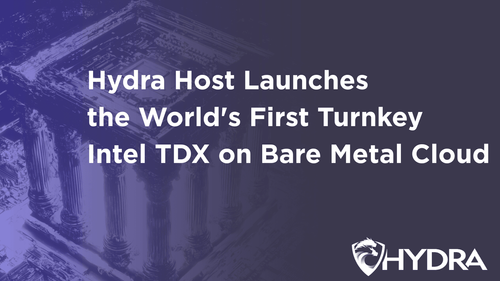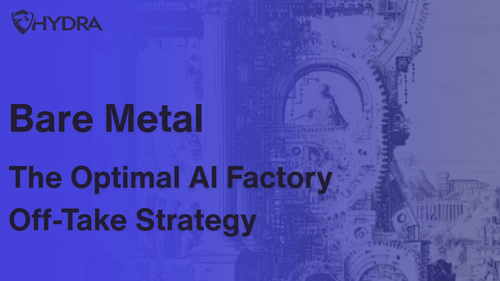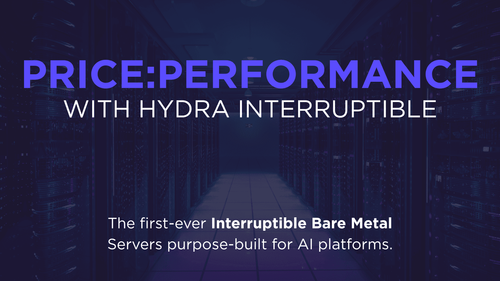AI Factories In A Box: Why Franchising is the Future of Data Centers
In the 1950s, McDonald’s revolutionized the fast-food industry, expanding from a single restaurant to over 200 locations in just five years. This kind of growth was unprecedented, and the secret lay in Ray Kroc’s now ubiquitous innovation: franchising.
Kroc created a system to empower capable entrepreneurs with their own capital to scale what worked and piggyback on the parent company's brand credibility, expertise, resources, and distribution. The franchise model enabled rapid expansion while maintaining standardized operations, procurement, and delivery. Across industries ranging from dining to automotive care to shipping and logistics, the franchise model has since devoured many smaller competitors who simply lacked the scale and flexibility to compete.
Today, a similar transformation is playing out in real time for AI factories—high-performance computing (HPC) data centers optimized for artificial intelligence workloads. These GPU-focused facilities, the backbone of AI development, face challenges that echo those of early McDonald’s: high capital needs, ever-changing operational complexity, and scalability bottlenecks. Here's how franchising can offer the same breakthrough for AI factories as it has in many other industries.
The Challenge of Monetizing AI Factories
Building an AI factory is no small feat. These data centers require significant capital outlay for real estate, infrastructure, and high-performance servers. And that's only the beginning. Once the facility is operational, the real challenge emerges: distribution and monetization.
For most data center operators, setting up hardware is the easy part. Creating and deploying an entire cloud platform so customers can actually utilize that hardware, and acquiring those customers, present an entirely new set of challenges that's wholly alien to the traditional data center industry. As a result, even well-funded data centers often struggle to attract sustained demand or stand out in an increasingly crowded market.
A recent example highlights this reality: data center Equinix acquired Packet, a promising bare metal cloud company, for $335 million in 2020. Despite high expectations, Equinix recently announced the sun-setting of the renamed Equinix Metal Cloud offering to refocus on its core colocation business.
The Packet acquisition and subsequent scale up investment by Equinix failed, resulting in a massive write-off. The example of Equinix Metal underscores the complexities of running a cloud business alongside a traditional data center business. Each has vastly different operational and customer needs, and even a company with Equinix's vast resources couldn't effectively bridge the gap.
This presents a critical issue. The global AI ecosystem benefits from decentralization, where a diverse range of independent data centers can ensure competition, innovation, and resilience. However, without a scalable and replicable growth model, the industry risks GPU power becoming concentrated in the hands of a few dominant players, stifling competition and creating chokepoints for innovation. That is of course, much like the traditional cloud.
Franchising as a Solution
Franchising offers entrepreneurs the opportunity to be at an industry's cutting edge day one. Just as McDonald’s created a template for entrepreneurs to replicate its operations, AI factory franchising will provide a standardized blueprint for data center expansion and operations using near-turnkey software and ongoing full stack support.
Through a franchise model, individual operators and investors can deploy their expertise and resources in developing their own AI Factory projects, while benefiting from shared procurement operations, financing relationships, software infrastructure, distribution channels, and of course an existing customer base.
Contrast this with today's non-standardized approach, wherein aspiring data center operators must reinvent the wheel and spend precious time and resources rediscovering existing best practices to finance, procure, and monetize their chips.
Here's how Hydra Host is pioneering data center franchising:
- Faster, Cheaper Infra Procurement: Small, independent data centers often struggle to acquire the latest GPU models as quickly as their large cloud company competitors. When they do get a quote, they often lack the leverage needed to access fair pricing. Hydra takes care of pricing leverage, providing small data centers the benefits of scale instantly. Through existing relationships with companies like NVIDIA and various infrastructure and OEM partners, Hydra Host aggregate orders and passes those benefits directly to our DC partners.
- Easy-to-Use, Standardized Infrastructure: Hydra Host's Brokkr platform features a bare metal management and provisioning system, providing a source of truth for server management and status, as well as a way to monetize bare metal servers in a secure and automated way. Bare metal skips the need for a hypervisor or containerized abstraction layer, reducing complexity and increasing stability and performance, making it a premium choice for AI model and platform companies. It also means servers on Brokkr are compatible and can be pushed to third party marketplaces, such as Runpod and salad.com, to supplement Hydra driven demand when needed.
- Centralized Distribution: Creating a competitive platform is one of the biggest hurdles independent data centers face. Brokkr takes care of this and acts as a unified user interface and API for all of our DC partners, delivering end customers a reliable, centralized source of supply with a predictable and standardized purchasing experience.
Hydra Host solves provisioning for its clients, handling utilization and passing along the benefits of a its standard and ecosystem so data centers only have to concern themselves with on-premise day to day operations and maintenance.
- Outsourced Customer Acquisition and Sales: Just as McDonald’s centralized its branding and marketing, Hydra is constantly sourcing paying customers and funneling clients to data centers integrated with Brokkr. Individually, independent operators can't compete with industry giants long term. But as part of the Brokkr umbrella and ecosystem, data centers can combine to quickly scale to more locations and provide more diverse offerings and configurations than any centralized cloud provider can hope to match.
- Financing: Hydra Host exploits its visibility into compute and hardware pricing, as well as its procurement channels, to provide its clients advantageous and rapid access to equipment financing. Hydra's finance partners can underwrite with greater precision, confidence, and speed than any other financiers in the space. This means Hydra's data center clients enjoy better and faster financing than they could access anywhere else.
Why It Matters
Franchising AI factories wouldn’t just enable faster growth; it could democratize the entire AI infrastructure market. A distributed network of AI factories, each independently owned but operating under a standardized system, could help ensure that GPU power isn’t concentrated in a handful of companies or geographies, and enable much more experimentation and innovation.
Franchising allows investors and operators to scale what works instead of reinventing the wheel. Data centers are overdue for a turnkey, just-add-capital approach allowing them to focus on scaling instead of fighting for relationships and rediscovering what their competitors already discovered years before.
The Road Ahead
Franchising isn’t a silver bullet, and there are significant challenges to overcome. The balance between standardization and local flexibility can be tricky to manage.
However, the potential benefits are significant. Franchising has historically demonstrated its power to improve the odds of success in competitive industries. For example, while only ~20% of independent restaurants survive beyond five years, top franchises like McDonald’s boast survival rates of over 90% in the same timeframe.
AI factories will follow a similar dynamic. Standalone data centers often face steep challenges, including building platforms, acquiring customers, and navigating competitive pressures. A franchising model for AI factories delivers the same advantages franchises provide in other industries: a proven playbook, operational support, and the strength of a unified brand. By empowering local entrepreneurs with these tools, franchised AI factories unlock a path to greater success, ensuring more resilient and distributed AI infrastructure worldwide.



